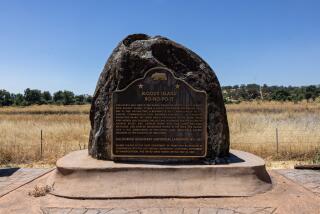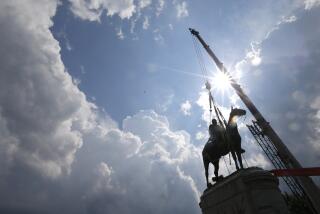Black Caucus members seek name change for city of Fort Bragg
- Share via
Reporting from Sacramento — Members of the California Legislative Black Caucus have asked the mayor of Fort Bragg, in the northern part of the state, to seek a change in the city’s name to disassociate it from the Confederate army general for whom it is named.
Fort Bragg began in 1857 as a military outpost to oversee the Mendocino Indian Reservation. One of its founders named it after his former commanding officer, Braxton Bragg, who later became a general in the Confederate Army. Before joining that force, Bragg was an officer in the United States Army.
Eight members of the caucus signed a letter to Mayor Dave Turner on Thursday that said a name change for the city of 7,200 people is a natural follow-up to the state’s recent ban on public display of the Confederate flag.
“These legislative efforts have fostered a needed discussion about the inappropriateness of any public entity promoting individuals that committed treason against our nation during the Civil War and fought to defend the defenseless cause of slavery,” said the letter, signed by caucus members including Chairman and Assemblyman Reginald Jones-Sawyer Sr. and Vice Chairman and Sen. Isadore Hall III.
The letter notes that the namesake of the small city in Mendocino County owned 105 slaves and “led many bloody battles” against the Union Army.
“We are hopeful that you will engage your community in a serious reexamination of the historical implications of your city’s name and come to the conclusion that now is the time to end your ties to such a disgraced and treasonous figure in our nation’s history,” the letter said.
The request was made after state Sen. Steve Glazer (D-Orinda) filed a bill to prohibit the naming of schools, parks and other public facilities after Confederate leaders. Glazer later changed his proposal to exclude cities.
Fort Bragg Vice Mayor Lindy Peters said the name would not be changed.
“While I completely agree with the effort to remove the Confederate flag from the South Carolina State Capitol, I would argue that asking us to change our name is taking things a bit too far,” he said in an email to The Times. “You cannot change history.”
He said Bragg never set foot in the area, and the outpost was established before the Confederacy: “Therefore, our community was not named to glorify the Confederacy.”
Peters said that by the logic of the caucus’ letter, President Andrew Jackson should be removed from the $20 bill because of his role in decimating the Native American population.
“We are a tight-knit community who do not favor changing our name, especially when pushed to do so by politicos who have never even visited our town and know nothing of our long and rich local history,” Peters said.
Patrick.mcgreevy@latimes.com
Twitter: @mcgreevy99
More to Read
Sign up for Essential California
The most important California stories and recommendations in your inbox every morning.
You may occasionally receive promotional content from the Los Angeles Times.














